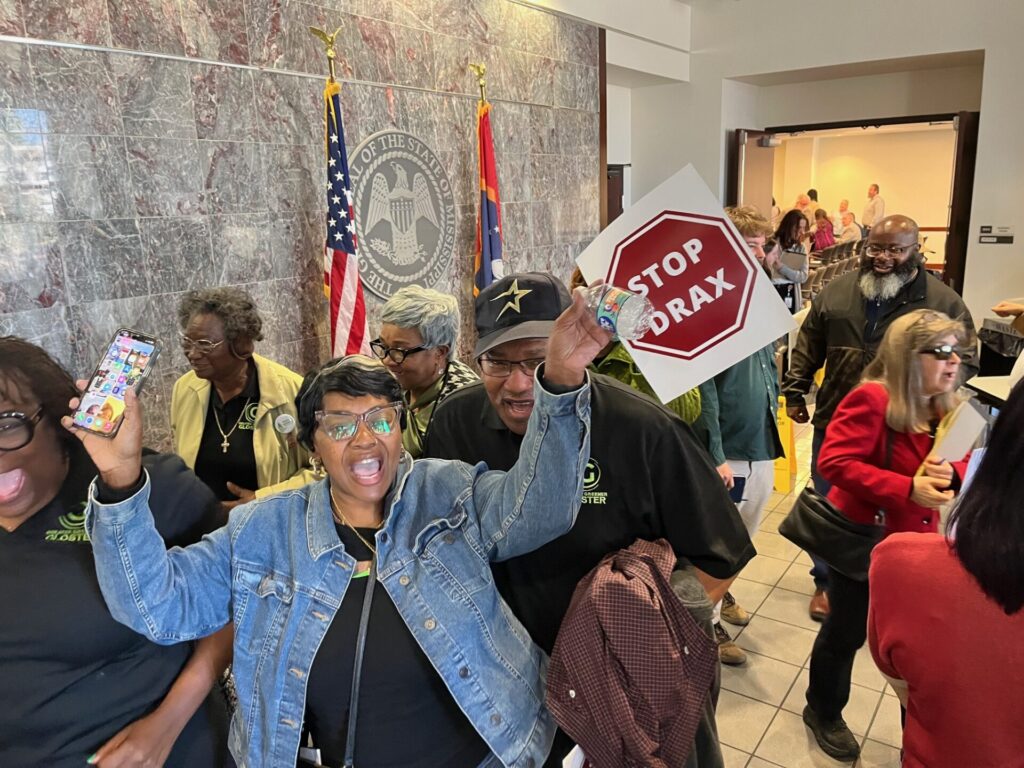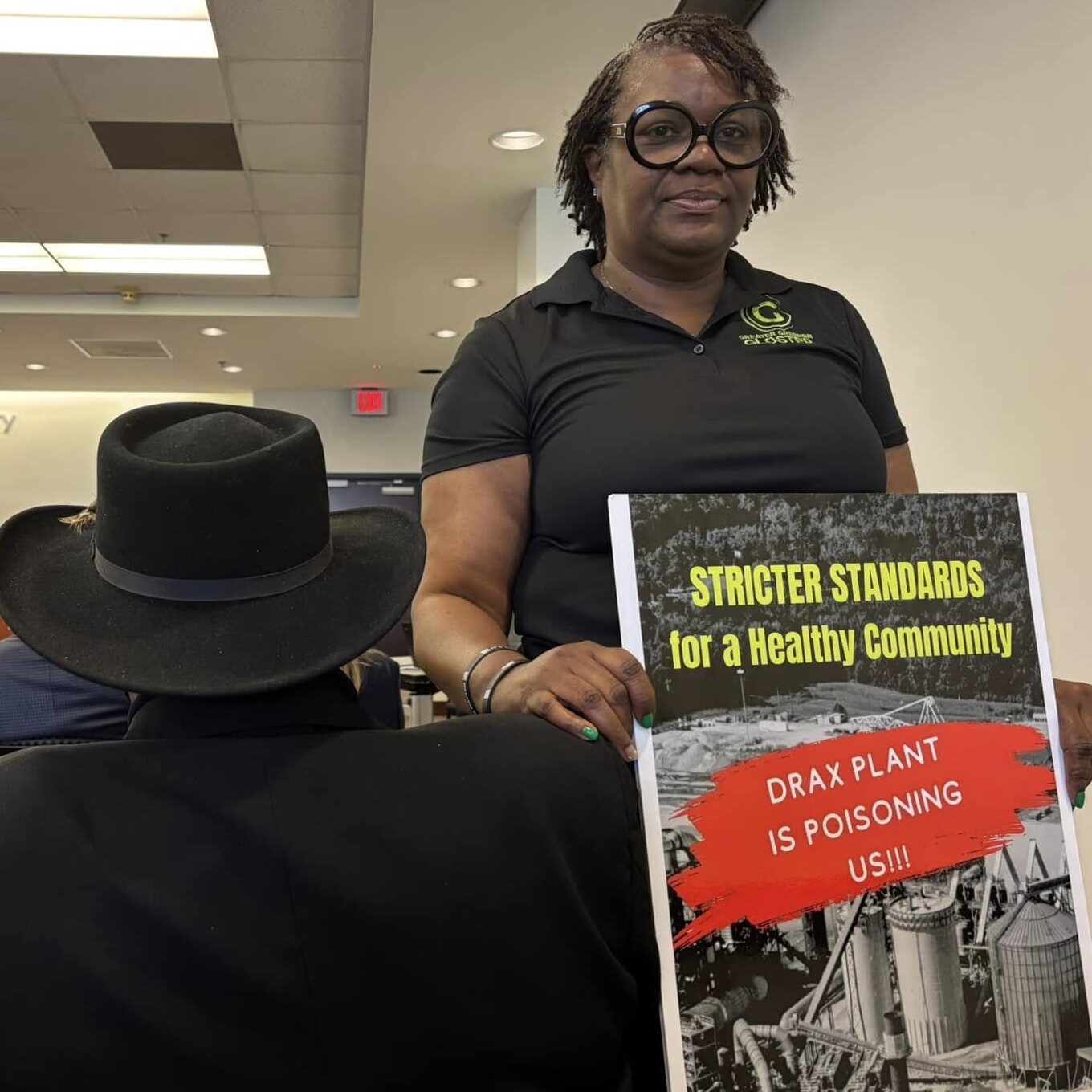
On Tuesday, April 8, the Mississippi Department of Environmental Quality (MDEQ) shut down Drax’s attempt to increase pollution at its Amite BioEnergy wood pellet mill in Gloster, MS. Drax wanted to upgrade its status from a minor polluter to a major source of hazardous air pollutants—but the MDEQ permit board wasn’t having it and the Drax permit was denied.
Why? Drax has a track record of breaking the rules and hasn’t followed through on previous enforcement orders. Because of these ongoing violations, and because of impactful testimony from area residents, the board denied both a new construction permit and a Title V air permit.
No green light for Drax—just a clear message: clean up your act first.
Drax has dirty history of pollution violations
Drax has racked up so many air pollution violations that even MDEQ—an agency known for giving industry a pass—couldn’t look the other way this time. The wood pellet mill’s track record speaks for itself: a $110,000 fine in 2019, a record-setting $2.5 million fine in 2020, a warning letter in 2022, and violation notices in both 2023 and 2024. And it’s not over—more fines and enforcement actions are still on the way for Drax’s latest permit breaches.
The Drax Bioenergy wood pellet mill processes pine into pellets, which are then shipped overseas to be burned as a source of energy. When Drax grinds, dries, and bakes thousands of tons of pine trees into wood pellets, it releases a cocktail of chemicals into the air. Pine resins and oils give off volatile compounds—especially aromatic hydrocarbons—as the wood is processed. Among the top pollutants are formaldehyde, methanol, and acrolein, all known to irritate the lungs and airways at high levels. And it’s not just chemicals—dust constantly hangs in the air around the Drax mill, adding to the pollution problem.
Gloster residents suffer the effects of air pollution
In 2023, Brown University and Tougaloo College teamed up to conduct a health survey in Gloster, focusing on families living within 2 miles of the Drax wood pellet plant. What they found was alarming: 95% of the 67 households surveyed reported health problems. The numbers paint a troubling picture—55% had frequent coughing, 75% suffered eye irritation, 66% dealt with nasal issues, 88% experienced recurring sinus infections, and 64% reported throat irritation.
The Drax mill sits alarmingly close to people’s homes in Gloster. Unlike other Mississippi towns with wood pellet plants—like Lucedale, where facilities are tucked away in industrial parks—Gloster has families living right up against the Drax fenceline. That kind of placement should never have been allowed—an unfortunate decision by county planners, the consequences of which current residents still endure.
When concerned residents raise the issue, MDEQ’s permit board often shrugs it off, saying, “We don’t handle zoning—we just issue permits.” But zoning and permitting are deeply connected, and in Mississippi, both are often handled poorly.
At this point, it’s unlikely Drax will relocate. That leaves only one meaningful option: strict limits on emissions. Modifying or denying a permit may be the only way to protect the community—though MDEQ has shown little appetite for either in the past.
Community members of all ages take action to fight pollution

More than 50 extremely concerned Gloster residents traveled to Jackson, MS to address the permit board about their health concerns and the fact that respiratory problems are rampant among area residents due to Drax’s current level of pollution.
One by one, they stepped up to the podium, sharing firsthand accounts of the respiratory issues plaguing their community—issues linked to Drax’s relentless emissions of dust, smoke, toxic chemicals, and combustion gases.
Speakers ranged in age from just 8 years old to 62, united in their stories of asthma, bronchitis, persistent coughing, and constant sinus and throat irritation. One man spoke solemnly about Gloster’s cemetery, where the “new” section is filling far faster than expected—with neighbors lost to respiratory illnesses and related heart complications.
After everyone had spoken, the board turned to DEQ permit writer Jaricus Whitlock for answers. They learned that Drax has been limiting production just to stay under its current emissions limits. But if the company got a new permit, it would mean more production—and more pollution—without any real improvements to protect air quality.
After hearing testimony, the board came back and made a surprise move: they voted to deny both of Drax’s permit requests. Their reasons? Drax’s poor track record and unresolved enforcement issues. It was clear they couldn’t look Gloster’s residents in the eye and vote “yes.”
Women of color lead the charge

This decision wouldn’t have happened without the powerful voices from Gloster—especially the women who led the charge. Dr. Krystal Martin of Greater Greener Gloster and Kathy Egland of EECHO delivered sharp, well-informed opposition throughout the meeting. Two other women brought the health crisis into full focus: Carmella Causey, 62, who spoke while using oxygen, and 8-year-old Leslie Harvey, who told the board she has asthma and can’t even play outside. Their courage showed just how deeply the community is suffering.
This was a rare win. In 20 years of watching MDEQ, this was the first time I’ve seen the board deny a permit by a 5-vote majority. Drax will likely appeal the decision—they have lawyers and lobbyists ready—but at least this time, it’s MDEQ’s legal team that will have to defend the board’s choice, not the citizens of Gloster fighting uphill.
Credit goes to years of grassroots organizing led by Dr. Krystal Martin, with key support from Dogwood Alliance. Many others joined the fight: Save R Youth Save R Future, Mississippi Rising Coalition, Mississippi People’s Movement, Healthy Gulf, EEECHO, MS Education Organizing Alliance, Desoto Mutual Aid Collective, ADOS Mississippi, and ReRootD Futures Initiative.
This is what community power looks like. The people of Gloster made their voices heard—and the state listened.
###
Andrew Whitehurst works to develop and implement healthy waters campaigns in Mississippi, advancing Healthy Gulf’s public policy positions through administrative comment writing, public education, and mobilization. Andrew has a B.A. in English from L.S.U. in 1982; a Master’s Degree in Wildlife Ecology from Mississippi State University in 1990; and a J.D. from the Paul M. Hebert Law Center at L.S.U. in 1997. His experience includes work in coastal fisheries research, law, and conservation outreach.
